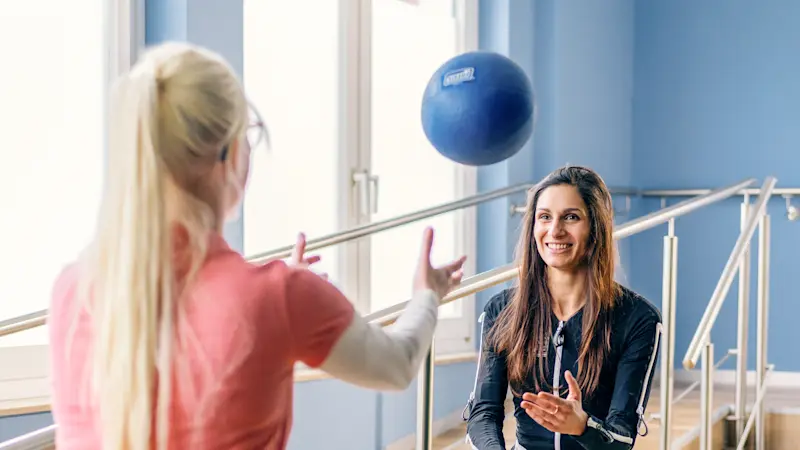“Superhero suit” gives hope to people with MS
May 30th is World MS Day

Thursday, 25 May 2023
More than 2.8 million people worldwide suffer from multiple sclerosis (MS) - and the number is growing.(1) MS is the most common neurological disease, affecting young adults and leading to permanent disability. MS affects the central nervous system and there is currently no cure for the disease. The last 15 years, the World MS Day, May 30th, has been chosen to raise awareness for MS. This year's motto, “connections”, is about solidarity and international awareness and highlights the latest medical options; one of them being the Exopulse Mollii Suit. Developed in Sweden, this neuromodulation suit is one of its kind, using electrostimulation to relax muscle tension caused by spasticity and relief associated pain. Ottobock’s medical device can help people with MS achieve targeted, rapid and lasting relief, creating better quality of life.
The disease with a thousand faces
In MS, the insulating layer of myelin, that surrounds nerve fibers, is irreversibly damaged for reasons that are still unknown. The broad range of symptoms has also earned MS the name “disease with a thousand faces” and can lead to motor disorders such as spasticity, resulting in paralysis of the extremities. Muscles permanently tense up, become stiff and interfere with everyday movements. Spasticity related pain is also common in MS.
“MS has always restricted me every second of my life. I could neither breathe nor move freely,” says mother of two, Kerstin from Germany, who found out about the suit via Instagram and writes about her life with MS under the pseudonym “Mama with MS”.
MS is more common in women, who are twice as likely to develop the disease compared to men. Three out of four people with MS have the relapsing-remitting form of MS, especially in the beginning of the disease’s progression. Conventional medication therapies mainly aim at reducing the frequency of relapses. A non-invasive alternative is the innovative neuromodulation suit developed by Swedish chiropractor Fredrik Lundqvist. Many users call the Exopulse Mollii Suit their “superhero suit”.
58 Electrodes enable relaxation
In this neuromodulation suit, 58 integrated electrodes are used to stimulate 88 individual muscles affected by spasticity, which makes it the first suit worldwide, to make use of a physiological reflex mechanism, the reciprocal inhibition: an electrical signal sent to an antagonistic muscle causes the spastic, opposing muscle to relax. For example, when the biceps is spastic, the Exopulse Mollii Suit stimulates the triceps to relax the biceps. In this targeted approach, spastic muscles are relaxed, weak muscles are (re)activated and spasticity related pain can be reduced. Other positive results can include: improved mobility, range of motion, balance, fall prevention and blood circulation.
Patients usually wear the Exopulse Mollii Suit every other day, for 60 minutes. In many cases only one hour of stimulation is needed to maintain the effect during many hours after the use. The Exopulse Mollii Suit is non-invasive and non-pharmaceutical, and has almost no side effects, compared to conventional management of spasticity. The suit consists of a jacket, pants and a battery-driven, removable, control unit. The Exopulse Mollii suit can also help people with other neurological movement disorders resulting in spasticity, for example cerebral palsy, and stroke.
“Above all it was important for me to create a high quality, user-friendly and easy to use medical device. In the Exopulse Mollii Suit a form of electrostimulation, neuromodulation, is used. It directly targets reflexes in the central nervous system, resulting in beneficial effects such as for example muscle relaxation. The Exopulse Mollii suit is unique, no comparable product is available worldwide,” says Fredrik Lundqvist about the benefits of the suit.
60 minutes make a difference
Clinical studies confirm the effect: In patients with multiple sclerosis, cerebral palsy and stroke, balance can be improved after just 60 minutes which reduces the risk of falling. With one hour of use, every other day, the improvements can be kept in most cases. In the same study, one hour of neuromodulation significantly reduced spasticity related pain in the users of the three groups. Four weeks later, thanks to the carry-over effect, users often recorded lasting pain relief.(2)
“Being able to reduce the suffering of people with disabilities worldwide, is giving me, and others involved with the Exopulse Mollii Suit, a strong feeling of happiness,” says Fredrik Lundqvist, who back in 2009 presented the first prototype of the suit in the Swedish version of the TV show “Shark Tank”. “We also developed the suit for the relatives and other people around a person suffering from disability. My biggest goal is for the suit to be recognized all over the world, to reach many people who can be helped by it.”
Overview: Exopulse Mollii Suit
User-friendly neuromodulation suit consisting of jacket and pants and removable control unit
Helps people with multiple sclerosis, cerebral palsy, stroke and other neurological disorders that cause similar symptoms
Targets specific muscles: 58 electrodes stimulate individually affected muscle groups
Activates muscles, reduces spasticity and reduces spasticity related pain
Improves mobility, balance and blood circulation, as well as everyday movements such as walking and grabbing
Available in 37 sizes for children, teenagers and adults
Recommended use: every other day for 60 minutes
“Carry-over effect”: muscles remain relaxed after use
Gentle, non-invasive and non-pharmaceutical
Further Information
Product information: Exopulse Mollii Suit
Patient story: Kerstin with MS
Video: Louisa with MS
(1) What is MS | Multiple Sclerosis (msif.org)
(2) Exopulse Registry Clinical Research Report; Data on File
Image - “Superhero suit” gives hope to people with MS - Louisa Physiotherapy - (c)Ottobock
Image - “Superhero suit” gives hope to people with MS - Louisa - (c)Ottobock
Image - “Superhero suit” gives hope to people with MS - Kerstin 1 - (c)Ottobock
Image - “Superhero suit” gives hope to people with MS - Kerstin 2 - (c)Ottobock
4 results out of 5

